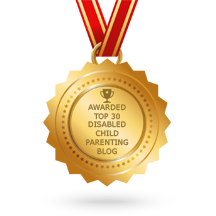7 Ways to Advocate and Support Friends and Family with a Rare Disease
I had a question from one of my friends today so I thought I would address it in a blog post. This person asked me, "What is the best way for me to be an advocate for my parent friends who have children with rare diseases?" Well now, that is an excellent question!

As parents of children with rare diseases, we get thrown into this world without any idea how to navigate it by ourselves. If you're lucky, there is a support group for your child's disease. But our friends may not even know the lingo, the name of the disease, or how they can support you on your journey. In the beginning, we didn't even have the correct diagnosis (as happens many times in the rare disease world). I contemplated this question and thought I would give you a list of ways to help the rare disease parent in your circle.
- Ask questions - it's ok to ask questions about the disease. We expect it. Rare Disease parents are learning as they go. Sometimes we can answer your question and sometimes we can't. Just remember that there is a huge learning curve for most parents, even if they are in the medical field or have a background in science. Keep in mind that even the doctors are still learning about the disease in most cases. Just be gentle in your approach and be respectful if the parent doesn't want to answer some of the harder questions.
- Educate yourself - along the same lines as asking questions, you can do your own research. Many rare diseases have their own advocacy groups and/or non-profit foundations. Look up the name of the disease and see what you can find. As you learn more about the disease, you may find ways to help the parent(s) on those websites.
- Offer to help with household chores or cooking meals - especially in the beginning. When a family gets a rare disease diagnosis, or even as they are in the hospital or going to multiple doctor visits, household stuff takes a back seat. Offer to come over and do the dishes, laundry, mow the lawn, etc. It's the little things that help. You don't have to make a grand gesture. Sometimes something as simple as cooking a meal can help at the end of a very long day at the hospital or doctor.
- Create a care package - with love. Think about your friend or family member and what they like. What would bring them comfort? Create a package with things that might make them more comfortable at the hospital, such as favorite snacks, a good cup of coffee, a fuzzy pair of socks, or even a good book or magazine. Don't forget the dads too!
- Participate in fundraisers or other events - Sometimes this could be a fundraiser for the disease-specific advocacy group. Other times it could be a general type of fundraiser. If there is no group for the disease, there are many other inclusive groups that cover all rare diseases. Global Genes, National Organization for Rare Disorders (NORD), and EveryLife Foundation are some here in the United States.
- Be understanding of their life change - Getting a diagnosis of a rare disease is life-changing for the whole family. Routines often have to change. Priorities get shifted. Energy levels plummet. It takes time to adjust and there is usually a grieving process. Your friends and family still want to connect with you, but they may not have the capacity to spend a lot of time with you initially. Just be there for them when they ask.
- Ask how you can help - When in doubt, ask the caregivers how you can help. Sometimes the easiest thing to do is ask what they need. Is there a sibling who needs a ride home from band practice? Do they need a couple of things from the grocery store next time you go? Maybe they just want someone to come sit with them and listen. You don't necessarily need to give money to an organization to help out a friend. Often just a listening ear and a shoulder to cry on is the best help you can give.
However you decide to help out, just know that the smallest things can make a big impact. Reach out and help when and where you can. We appreciate all the love and support we can get here in the Rare Disease community. Thank you for being willing to support us on our journey.

